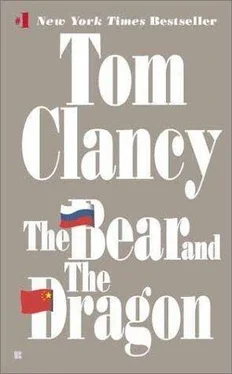Tom Clancy - The Bear and the Dragon
Здесь есть возможность читать онлайн «Tom Clancy - The Bear and the Dragon» весь текст электронной книги совершенно бесплатно (целиком полную версию без сокращений). В некоторых случаях можно слушать аудио, скачать через торрент в формате fb2 и присутствует краткое содержание. Год выпуска: 2001, ISBN: 2001, Жанр: Триллер, на английском языке. Описание произведения, (предисловие) а так же отзывы посетителей доступны на портале библиотеки ЛибКат.
- Название:The Bear and the Dragon
- Автор:
- Жанр:
- Год:2001
- ISBN:780425180969
- Рейтинг книги:3 / 5. Голосов: 1
-
Избранное:Добавить в избранное
- Отзывы:
-
Ваша оценка:
- 60
- 1
- 2
- 3
- 4
- 5
The Bear and the Dragon: краткое содержание, описание и аннотация
Предлагаем к чтению аннотацию, описание, краткое содержание или предисловие (зависит от того, что написал сам автор книги «The Bear and the Dragon»). Если вы не нашли необходимую информацию о книге — напишите в комментариях, мы постараемся отыскать её.
The Bear and the Dragon — читать онлайн бесплатно полную книгу (весь текст) целиком
Ниже представлен текст книги, разбитый по страницам. Система сохранения места последней прочитанной страницы, позволяет с удобством читать онлайн бесплатно книгу «The Bear and the Dragon», без необходимости каждый раз заново искать на чём Вы остановились. Поставьте закладку, и сможете в любой момент перейти на страницу, на которой закончили чтение.
Интервал:
Закладка:
“No one will know?”
“No, that is not possible.”
“And it will not get me into trouble?”
With that question he rolled over, finding himself on top. He held her face in both hands. “Would I ever do something to get Ming-chan in trouble? Never!” he announced, with a deep and passionate kiss.
Afterward there was no talk about the CD-ROM, which she tucked into her purse before leaving. It was a nice-looking purse, a knockoff of something Italian that you could buy on the street here, rather like the genuine ones in New York that “fell off the back of the truck,” as the euphemism went.
Every time they parted, it was a little hard. She didn’t want to leave, and truly he didn’t want her to depart, but it was necessary. For them to share an apartment would be commented upon. Even in her dreams, Ming couldn’t think of that, actually sleeping at the apartment of a foreigner, because she did have a security clearance, and she had been given her security brief by a bored MSS officer, along with all the other senior secretaries, and she hadn’t reported this contact to her superiors or the office security chief as she ought to have done-why? Partly because she’d forgotten the rules, because she’d never broken them or known someone who had done so, and partly because like many people she drew a line between her private life and her professional one. That the two were not allowed to be separate in her case was something that the MSS briefing had covered, but in so clumsy a way as to have been disregarded even upon its delivery. And so here she was, not even knowing where and what here was. With luck, she’d never have to find out, Nomuri thought, watching her turn the corner and disappear from view. Luck would help. What the MSS interrogators did to young women in the Beijing version of the Lubyanka didn’t really bear much contemplation, certainly not when one had just made love to her twice in two hours.
“Good luck, honey,” Nomuri whispered, as he closed the door and headed to the bathroom for a shower.
CHAPTER 14 (dot)com
It was a sleepless night for Nomuri. Would she do it? Would she do what she was told? Would she tell a security officer about it, and then about him? Might she be caught with the CD-ROM going into work and questioned about it? If so, a casual inspection would show it to be a music CD, Bill Conti’s musical score for Rocky -a poorly marked knockoff of an American intellectual property that was quite common in the PRC. But a more careful examination would have revealed that the first-outermost-data line on the metallic surface told the computer CD-ROM reader to skip to a certain place where the content was not music, but binary code, and very efficient binary code at that.
The CD-ROM didn’t contain a virus per se, because a virus circulates mainly across computer networks, entering a computer surreptitiously the way a disease organism enters a living host (hence the term virus). But this one came in the front door, and on being read by the CD-ROM reader, a single prompt came up on the screen, and Ming, after a quick look-around in her office, moved her mouse to put the pointer on the prompt, clicked the INSTALL command, and everything immediately disappeared. The program thus implanted searched her hard drive at nearly the speed of light, categorizing every file and setting up its own index, then compressing it into a small file that hid in plain sight, as it were, identified by any disk-sorting program with a wholly innocent name that referred to a function carried out by another program entirely. Thus only a very careful and directed search by a skilled computer operator could even detect that something was even there. Exactly what the program did could only be determined by a one-by-zero reading of the program itself, something difficult to accomplish at best. It would be like trying to find what was wrong with a single leaf on a single tree in a vast forest where all the trees and all the leaves looked pretty much alike, except that this one leaf was smaller and humbler than most. CIA and NSA could no longer attract the best programmers in America. There was just too much money in the consumer electronics industry for government to compete effectively in that marketplace. But you could still hire them, and the work that came out was just as good. And if you paid them enough-strangely, you could pay lots more to a contractor than to an employee-they wouldn’t talk to anyone about it. And besides, they never really knew what it was all about anyway, did they?
In this case, there was an additional level of complexity that went back over sixty years. When the Germans had overrun the Netherlands in 1940, they’d created a strange situation. In Holland the Germans had found both the most cooperative of their conquered nations and the most fiercely resistant. More Dutchmen per capita had joined the Germans than any other nationality-enough to form their own SS division, SS Nordland. At the same time, the Dutch resistance became the most effective in Europe, and one of their number was a brilliant mathematician/engineer working for the national telephone company. In the second decade of the twentieth century, the telephone had reached a developmental roadblock. When you lifted a phone, you were immediately connected with an operator to whom you gave the destination you were trying to call, and she then physically moved a plug into the proper hole. This system had been workable when only a few telephones were in use, but the appliance had rapidly proved too useful for limited applications. The solution to the problem, remarkably enough, had come from a mortician in the American South. Vexed by the fact that the local operator in his town referred the bereaved to a competing undertaker, he had invented the stepping switch, which enabled people to reach their own phone destinations merely by turning a rotary dial. That system served the world well, but also required the development of a whole body of new mathematical knowledge called “complexity theory,” which was systematized by the American company AT amp;T in the 1930s.
Ten years later, merely by adding additional digits to be dialed, the Dutch engineer in the resistance had applied complexity theory to covert operations by creating theoretical pathways through the switching gear, thus enabling resistance fighters to call others without knowing whom they called, or even the actual telephone numbers they were calling.
This bit of electronic skullduggery had first been noticed by an officer for the British Special Operations Executive, the SOE, and, finding it very clever indeed, he’d discussed it over a beer with an American colleague in a London pub. The American OSS officer, like most of the men Wild Bill Donovan had chosen, was an attorney by profession, and in his case, a very thorough one, who wrote everything down and forwarded it up the line. The report on the Dutch engineer had made its way to the office of Colonel William Friedman, then America’s foremost code-breaker. Though not himself a hardware expert, Friedman had known something useful when he saw it, and he knew there would be an after-the-war, during which his agency-later reborn as the National Security Agency-would still be busy cracking other countries’ codes and ciphers and producing codes and ciphers itself. The ability to develop covert communications links through a relatively simple mathematical trick had seemed a gift from God’s own hand.
In the 1940s and ’50s, NSA had been able to hire American’s finest mathematicians, and one of the tasks assigned them had been to work with AT amp;T to create a universal telephone operating system that could be used covertly by American intelligence officers. Back then, AT amp;T was the only real rival NSA had had in the hiring of skilled mathematicians, and beyond that, AT amp;T had always been a prime contractor for just about every executive agency of the government. By 1955, it was done, and for a surprisingly modest fee AT amp;T provided the entire world with a model for telephone systems that most of the world adopted-the modest cost was explained by the desire of AT amp;T to make its systems compatible with every other country’s to ease international communications. With the 1970s had come push-button phones, which directed calls electronically by frequency-controlled codes even easier for electronic systems to use, and infinitely easier to maintain than the former electro-mechanical stepping switches that had made the mortician hugely rich. They also proved even easier for AT amp;T to rig for NSA. The operating systems first given the world’s telephone companies by AT amp;T’s Parsippany, New Jersey, research laboratory had been upgraded yearly at least, giving further improvements to the efficiency of the world’s phone systems-so much so that scarcely any telephone system in the world didn’t use it. And tucked into that operating system were six lines of binary code whose operational concept traced back to the Nazi occupation of Holland.
Читать дальшеИнтервал:
Закладка:
Похожие книги на «The Bear and the Dragon»
Представляем Вашему вниманию похожие книги на «The Bear and the Dragon» списком для выбора. Мы отобрали схожую по названию и смыслу литературу в надежде предоставить читателям больше вариантов отыскать новые, интересные, ещё непрочитанные произведения.
Обсуждение, отзывы о книге «The Bear and the Dragon» и просто собственные мнения читателей. Оставьте ваши комментарии, напишите, что Вы думаете о произведении, его смысле или главных героях. Укажите что конкретно понравилось, а что нет, и почему Вы так считаете.






![Александр Ирвин - Tom Clancy’s The Division 2. Фальшивый рассвет [litres]](/books/417744/aleksandr-irvin-tom-clancy-s-the-division-2-falsh-thumb.webp)




